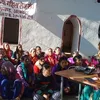This former school teacher from Meghalaya has empowered over 800 women with turmeric farming
In this week’s #SustainabilityAgenda series, we have Trinity Saioo, a Padma Shri Award winner, who is empowering women to grow the Lakadong turmeric organically.
Trinity Saioo, a former school teacher and a member of the Jaintia Hill Tribe in Meghalaya, is leading a silent revolution in her state by cultivating Lakadong Turmeric, a special variety of the spice that is native to Meghalaya.
The 53-year-old turmeric farmer from Mulieh village in the North-Eastern state is one among the many farmers cultivating this variety of turmeric.
In 2020, Trinity was awarded the Padma Shri for her work in developing sustainable organic farming and successfully training around 800 rural women to grow turmeric through organic farming methods.

Trinity Saioo
Trinity also formed a self-help group (SHG) of women farmers after she stepped into farming. Today, about 100 women SHGs work with her directly in turmeric farming at Hills Curcumin & Spice Producer Society, an association formed by Trinity in the hill state, where she serves as the Assistant General Secretary.
Trinity and the SHGs have also exported nearly 30 metric tonnes of Lakadong Turmeric to many parts of India.
How did it start?
Trinity recalls the time, around 2003, when the Spices Board of India visited her village.
“Although, they had an idea of Lakadong turmeric and its health benefits, they had very little knowledge on the cultivation and production process,” Trinity tells SocialStory.
“They wanted to look into it as an opportunity to bring it under a government scheme and introduce grants for the successful cultivation of growing Lakadong turmeric,” she recalls.
Though she comes from a family of farmers, it was only when the Board came visiting her that she realised the value of the turmeric variety and understood the demand for its medicinal properties.

The women farmers cleaning the Lakadong Turmeric
The Board then registered her name along with seven others from Mulieh under a subsidy scheme of three years, which was mandatory to be renewed every year.
Being a teacher by profession, she could speak both English and Hindi fluently, which was an added bonus for her to deal with the government officials in terms of facilitating the subsidy scheme.
Trinity then set off to visit the nearby villages to increase the capacity and create more awareness about the cultivation of turmeric organically. She then offered to train women as an alternative to traditional agricultural practices, in a bid to work towards added income and skill development.
Mission Lakadong
“With a firm network of SHGs in place to carry forward the agenda of women-led farming practices, I have pushed to avail the implementation of existing schemes and policies to strengthen the network of SHGs in the state,” she says.
Today, every member of the SHG is sufficiently contributing to meet the requirements that are sanctioned under different projects. The members have also increased in numbers since the beginning.
There are about 25 core members in the society formed by Trinity, which is registered in the government database, and has farmers from across Laskien Block, with more than 800 members.

Trinity at a horticultural sector growing Lakadong Turmeric
“Under the society, we have started with the vision of Mission Lakadong. We procured machines for the production and extraction process of turmeric and we also provide money to farmers to grow Lakadong in our operational areas,” she says.
With the help of the Board, Trinity was able to procure a number of Lakadong seedlings for the women. She then taught them how to grow them organically and remove the pest infestation with safer alternatives to chemical options.
The yield is then taken to the processing unit set up by Trinity, which has small grinding machines. “We collect the raw products from the local farmers, and my workers and I clean the turmeric. As we have nearly 86 villages in Laskien block, I have appointed local collectors to get the farm products from the farmers,” Trinity shares.
The main team has about ten farmer leaders who are working under her guidance. It also has project officers and staff, as many projects come through the agriculture and horticulture department.
The impact
Trinity has empowered more than 800 women in her village with Lakadong Farming, and about 100 women SHGs work directly under her.
Apart from exporting Lakadong Turmeric, Trinity is also preparing to export around three metric tonnes of dried ginger.
“I am happy that whatever I am doing along with the support of the district and respective department authorities, I am able to provide a survival way to the rural women farmers. Even if I am running short of financials, I make sure that these women are paid in time,” shares Trinity.

Over 800 women have been empowered with increased incomes through Trinity's initiative
In terms of operations, Trinity focuses primarily on Mulieh village and across the Laskien block in West Jaintia Hills district. But she has been trying to extend her operations across Meghalaya with the support of the Hill Farmers Union, where she is an active member.
The estimated cost for buying raw turmeric from the farmers is approximately Rs 50 lakh per year. Trinity says sometimes she also takes the support from buyers or companies who approach her for bulk orders.
But apart from that, Trinity has not received any additional investments or donations for her initiative. The main support came from the Spices Board, who also encouraged her to develop this variety.
A national recognition
In 2020, Trinity won the Padma Shri award for her efforts to increase the income of the women farmers in Meghalaya. She was also hailed as an ‘unsung hero’ by Union Minister Piyush Goyal.
She was also awarded for her work by the Balipara Foundation during the Annual Balipara Foundation Awards, 2020.
Trinity says the pandemic has not impacted her work. “As we are in the rural area, the impact of the pandemic has not been much. There has also not been a single COVID positive case reported from my village,” she says.
Despite the lockdown, the society managed to produce 16 metric tonnes of Lakadong Turmeric since 2020. Every day, nearly 20 workers get acquainted with the processing at her unit.
However, the biggest challenge now is to involve and encourage every farmer to grow the Lakadong variety due to its high medicinal value, in addition to a wider market range reaching out to international markets.
“I have no idea how to promote this high medicinal valued turmeric in front of the world. But with associated networks and partners, I think this can be achieved,” she says.
The road ahead
“I want Lakadong Turmeric to garner a greater international market so that the farmers are benefited and recognised at the same time. I also wish the products to be sold at a very decent price in the market,” says Trinity.
In the coming years, Trinity wants to pass on the knowledge and tradition of cultivating the Lakadong variety to the younger generations.
“This is a solution to the kind of economic problems faced by my community members and I urge the women to take this up as an added income source that would pave the way for socio-economic development and upliftment of their community,” Trinity says.
Edited by Megha Reddy








